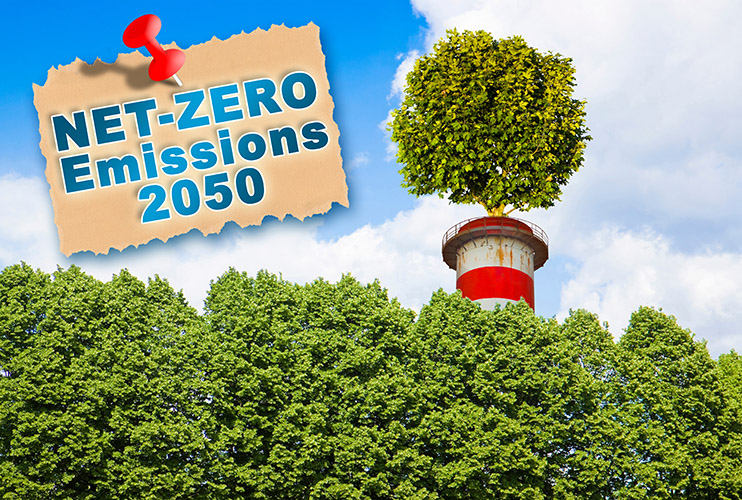The publication of the Climate Action Plan 2021 has been broadly welcomed by the construction, engineering and renewable energy sectors.
The plan lists the actions required to deliver on Ireland’s climate targets, including a commitment to reduce overall greenhouse gas emissions by 51% by 2030. The Climate Action Plan follows the Climate Act 2021, which commits Ireland to a legally binding target of net-zero greenhouse gas emissions no later than 2050.
Engineers Ireland
Professor Orla Feely, President, Engineers Ireland, said that climate breakdown and biodiversity collapse are the most serious issues of our time.
“Engineers Ireland strongly advocates for the principles and practices of sustainable development and welcomes the ambition of the Climate Action Plan,” Professor Feely commented. “The Plan, which will provide the pathway for Ireland to meet its international and EU climate commitments, contains ambitious and positive opportunities for change which will improve the quality of life of our citizens through increased investments and initiatives.”
Caroline Spillane, Director General, Engineers Ireland, added: “The publication of the Climate Action Plan will require the State to pursue and achieve, by no later than the end of 2050, the transition to a climate-resilient, biodiversity-rich, environmentally sustainable and climate-neutral economy. Ireland’s engineers will have a critical role to play in this transition and will use their ingenuity and problem-solving abilities to tackle the greatest challenge faced by modern humanity.”
Key targets within the Plan include:
- The enabling of 500,000 daily sustainable travel journeys by 2030 through major public transport projects such as BusConnects and Connecting Ireland; the expansion of rail services and cycling and walking infrastructure.
- The increase in the proportion of renewable electricity to up to 80% by 2030, including an increased target of up to 5 Gigawatts of offshore wind.
- Delivery of three new transmission grid connections or interconnectors to Northern Ireland, Great Britain, and the EU.
- Scaled up delivery of retrofitting, including the opening of three more training centres for retrofit upskilling and a programme to decarbonise the heating and cooling sectors by 2050.
- An increase in the number of EVs to circa 1 million by 2030.
- Planned publication of a whole-of-Government Circular Economy Strategy, the enactment of the Circular Economy Bill 2021, and the development of a Bioeconomy Action Plan.
- Implementing the National Planning Framework to promote compact and sustainable housing, growth and development.
- Promotion of the digital transformation, sustainable remote working practices and the roll-out of the National Broadband Plan.
- A Climate Action Delivery Board to be overseen by the Department of the Taoiseach to monitor delivery.
Irish Green Building Council
The Irish Green Building Council (IGBC) has welcomed the inclusion of whole life carbon targets for construction in the Climate Action Plan.
According to an initial assessment of carbon emissions associated with construction and operation of the Irish built environment published by the IGBC, embodied emissions account for 11% of Ireland’s emissions, the same as residential heating. To date, these emissions associated with the production and transportation of construction materials, and with constructing buildings and infrastructure have been largely ignored.
Pat Barry, CEO, IGBC, said: “Our industry is both resource and carbon intensive. We cannot reach our climate targets if we don’t address embodied emissions in construction. We are hence pleased with the commitments to carbon proof all major investments and to decrease embodied carbon in building materials contained in the plan.”
For the first time, the Climate Action Plan 2021 includes a commitment to introduce life-cycle assessment requirements for buildings and construction products and processes, as well as a commitment to develop a certification for recycled construction products. It also mandates the inclusion of green criteria in all public procurement from 2023 to ensure that what is built is consistent with Ireland’s climate ambition.
Besides measures to address whole-life carbon in the built environment, the IGBC has welcomed the new objective to enable 500,000 daily sustainable travel journeys by 2030.
The IGBC also welcomed the national retrofit programme presented in the plan and the introduction of micro and small-scale generation schemes, alongside the review of the current planning exemptions relating to solar panels.
Wind Energy Ireland
Welcoming the plan’s publication, Noel Cunniffe, CEO, Wind Energy Ireland, acknowledged the increased ambition for an 80% renewable electricity target.
“Wind energy is ready to lead the way to an 80% renewable electricity system by the end of the decade and on to a zero-carbon electricity system by 2035,” Noel Cunniffe commented. “We have large, and growing, pipelines of onshore and offshore wind energy projects. With the right planning system and a strong electricity grid, we will deliver the electricity targets in the Climate Action Plan. We are ready, alongside our colleagues in the renewable energy industry, to play our part in delivering the Climate Action Plan.”
Ecocem Ireland
Susan McGarry, Managing Director, Ecocem Ireland, said that the plan is the most progressive undertaking presented by the government in addressing Ireland’s role and the impact of the long term climate crisis.
“The action to reduce carbon emissions by 51% by 2030 is bold, admirable, and should be achievable for every aspect of industry. A sectoral breakdown of industry emissions shows that manufacturing combustion and process emissions from the mineral industry – and primarily cement manufacturing – account for the most significant share of emissions in this sector, and we are pleased that the government has correctly identified the extremely carbon-intensive nature of the production of clinker to make cement.
“The programme of work to decrease embodied carbon in construction materials, including through the use of low-carbon cement blends, is welcomed, but only by deploying the full spectrum of technical solutions will we meaningfully accelerate decarbonisation of the construction sector.”


